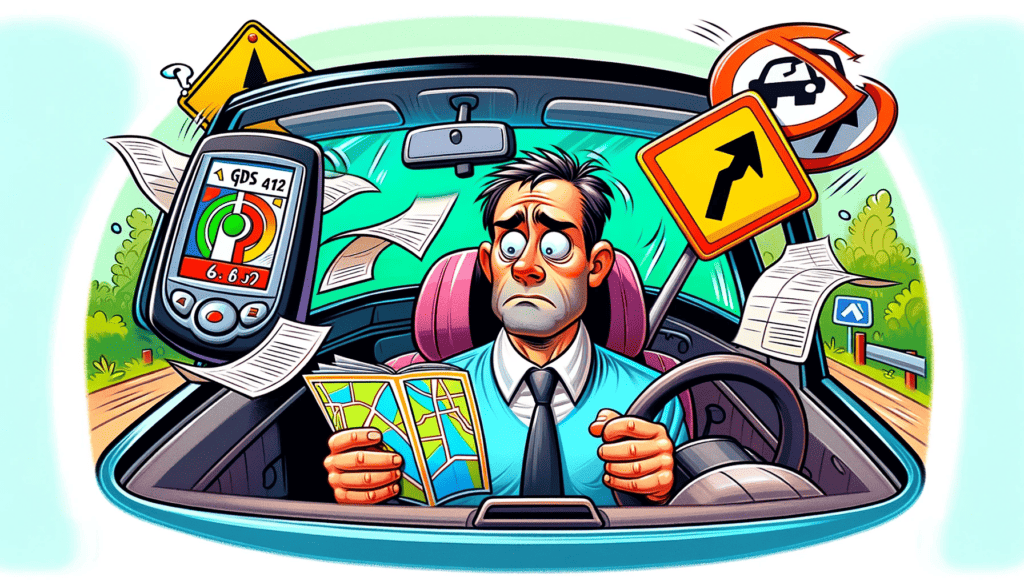
The Pitfalls of Overdependence on GPS
False Sense of Security
Relying solely on GPS navigation creates a false sense of security. Users often believe that GPS devices are infallible, leading them to disregard their surroundings or fail to plan adequately for their journey. This overconfidence can result in getting lost, running into unexpected road closures, or even ending up in unsafe areas.
Technology Failures
GPS systems are not immune to technological glitches. From signal loss in remote areas to software malfunctions, numerous factors can render a GPS device unreliable. When travelers depend solely on these devices, they can be left stranded without alternative navigation methods.
Reduced Spatial Awareness
Over-reliance on GPS navigation can diminish one’s spatial awareness and map-reading skills. Regular use of GPS tends to make users less attentive to environmental landmarks and more reliant on turn-by-turn instructions, which can impair their ability to navigate without technological assistance.
The Impact of GPS on Driving Skills
Distraction and Cognitive Load
GPS devices, especially when they provide real-time traffic updates and rerouting, can add to the cognitive load of the driver. This increased mental demand can lead to distraction, reducing focus on the road and increasing the risk of accidents.
Decreased Route Learning
Drivers who always use GPS are less likely to learn routes and become familiar with their surroundings. This lack of knowledge can be problematic if the GPS fails or if they find themselves in an area without a signal.
Overreliance in Unfamiliar Areas
Travelers in unfamiliar areas might rely too heavily on GPS, leading to a lack of preparation. Without a basic understanding of the area, they may find themselves in challenging situations if the GPS provides incorrect or outdated information.
Environmental and Technological Limitations
Signal Loss and Inaccuracy
GPS signals can be weak or nonexistent in remote areas, dense forests, deep valleys, or near tall buildings. In these situations, sole reliance on GPS can lead to getting lost or taking significantly longer routes.
Outdated Maps and Misleading Routes
GPS maps are not always up-to-date. Construction, new roads, and changes in traffic patterns can render GPS directions obsolete or incorrect, potentially leading users astray.
Weather-Related Issues
Extreme weather conditions like heavy rain, snow, or even solar flares can interfere with GPS signals. Relying solely on GPS in such conditions can lead to dangerous situations, especially in unfamiliar territories.
The Social and Psychological Effects
Reduced Interaction and Collaboration
Using GPS navigation reduces the need for interaction with locals or traveling companions for directions, potentially missing out on social interactions and local insights.
Decline in Navigation Skills
Constant GPS use can lead to a decline in traditional navigation skills, such as reading maps or following compass directions. These skills are crucial in situations where technology fails.
Stress and Anxiety
Dependence on GPS can cause stress and anxiety when the technology fails. Users may feel helpless or panicked, particularly in unfamiliar or challenging environments.
Safety Considerations
Emergency Situations
In emergencies, over-reliance on GPS can be particularly hazardous. If a device fails or leads to an unsafe area, it can escalate the danger, especially if the user lacks alternative navigation skills.
Security Risks
GPS devices can be a security risk, as they may store sensitive information such as home addresses or frequently visited locations. This information can be exploited if the device is lost or hacked.
Physical Safety
Sole reliance on GPS can lead users into unsafe areas or routes not meant for their mode of transportation. This can lead to accidents or situations where the user’s physical safety is compromised.
Alternatives and Complementary Methods
Traditional Maps and Compasses
Learning to use traditional maps and compasses can provide a reliable backup for navigation. These tools do not rely on technology and can be invaluable in areas with poor GPS reception.
Local Knowledge and Signs
Asking locals for directions or paying attention to road signs can often provide more accurate and up-to-date information than a GPS device.
Pre-Trip Research and Planning
Conducting thorough research and planning routes in advance can reduce dependence on GPS. Understanding the general layout of an area and having a planned route can help mitigate the risks associated with GPS failures.
A Balanced Approach
The Importance of a Hybrid Approach
A balanced approach to navigation, using GPS as a tool rather than a crutch, is crucial. Combining technology with traditional navigation skills and local knowledge ensures safer and more reliable travel.
Continuous Learning and Adaptation
Staying informed about the latest developments in navigation technology while maintaining and enhancing traditional navigation skills can provide the best of both worlds.
Embracing Technology Responsibly
Technology, including GPS, is a powerful tool that, when used responsibly and in conjunction with other methods, can greatly enhance our travel experiences. It’s important to remember that technology is an aid, not a replacement, for human judgment and skill.






Leave a Reply